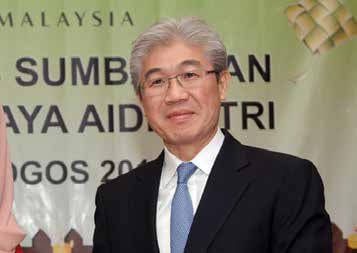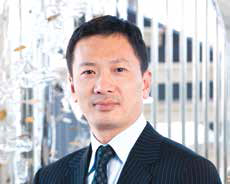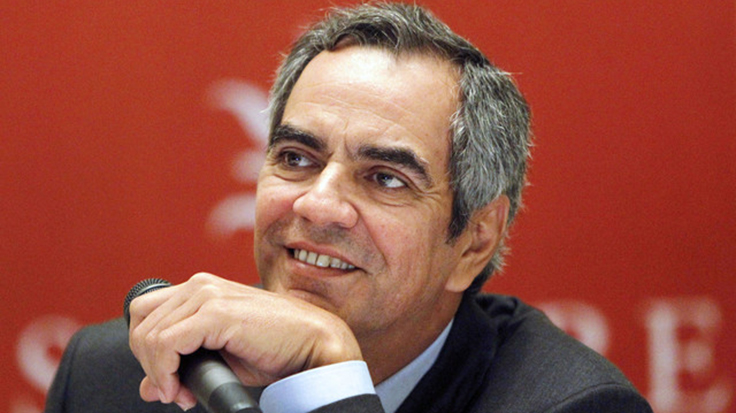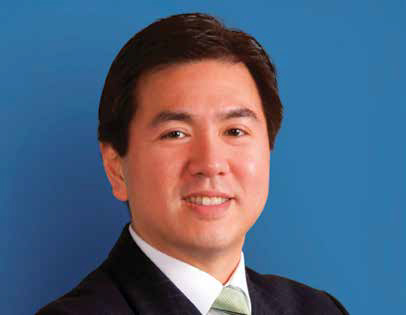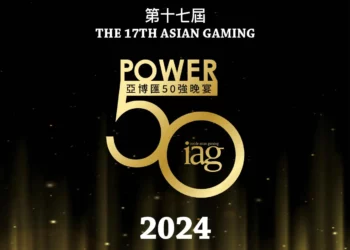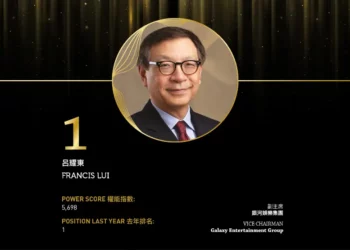10 Kazuo Okada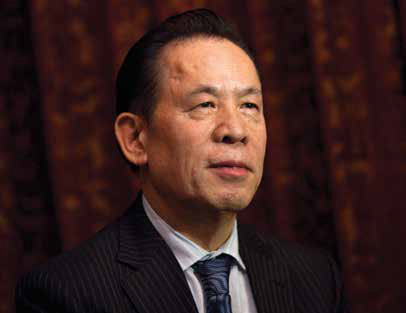
Chairman
Universal Entertainment
“It was the year 2008,” pachinko mogul Kazuo Okada recalls on the home page of the website for his Manila Bay Resorts project, expected to open late next year.
“A visit to the Philippines opened me up to the warmth, friendliness and hospitality of the Filipino people. Seeing the country’s enormous potential for growth and development, I decided that I want to be part of that promising future.
“Fast forward to this day, my vision is not just to build a successful business, but to make it a global leader—and just as importantly, to share the good fortune that will come from that success with the Filipino people and their communities.
“The property will be the world’s most magnificent casino resort. I hope that all Filipinos will be as proud as I am of what we will be achieving together in building it.”
At first glance, Mr Okada personally pitching his $2 billion resort in Manila’s Entertainment City might smack of irony since the Philippines and Mr Okada have thus far arguably not helped each other’s reputations.
Mr Okada made his fortune in Japan, graduating from juke boxes to pachinko machines, forming Universal Entertainment and its slot machine subsidiary Aruze. He became Steve Wynn’s partner after Mr Wynn was ousted from Mirage in 2000 following its takeover by Kirk Kerkorian and MGM Grand. Mr Okada staked Mr Wynn to the tune of $455 million over the next four years, receiving 20% of Wynn Resorts. Mr Okada’s money was instrumental in the development of Wynn in Las Vegas and Wynn Macau. In 2008, Mr Wynn famously declared of his vice chairman, “I love Kazuo Okada as much as any man that I’ve ever met in my life.”
But love doesn’t always last. In 2008, Mr Okada, who owns 67.9% of Universal, obtained one of four gaming licenses in the Philippines’ Entertainment City zone for integrated resorts. Mr Okada thought his friend would join the project, but Wynn Resorts declined. So Mr Okada proceeded alone, assembling 44 hectares (109 acres), the largest landholding in Entertainment City, for his resort and forming Tiger Resort, Leisure and Entertainment to oversee the development.
In 2011, Mr Okada and Mr Wynn began a very public brawl. Wynn Resorts said the Philippine project was inappropriate because it was a competitor to Macau—a notion few in the industry accept—and could threaten Wynn’s gaming licenses due to the country’s lax regulatory environment. Mr Okada was forced out as Wynn Resorts’ vice chairman.
New accusations flew. Mr Okada claimed the animosity grew out of him questioning the company’s $135 million donation to the University of Macau, and he questioned Wynn’s Cotai land deal, A Reuters investigative report alleged Universal had paid $40 million to an associate of Efraim Genuino, Pagcor’s chairman under President Gloria Macapagal Arroyo. Wynn Resorts released a report by former FBI Director Louis Freeh that charged Mr Okada with ethics violations over $110,000 of hospitality granted to Philippine officials at Wynn properties in Las Vegas and Macau; besmirched Pagcor officials claim they received only routine courtesy accommodations. In February 2012, Wynn’s board of directors voted to buy back Mr Okada’s stock at a 30% discount payable over 10 years, a deal that cost him $800 million at the time. The stream of allegations prompted investigations in five jurisdictions, some of them still open. Japanese probers cleared Mr Okada, but the unpleasantness has likely doomed his dream of getting a casino license in Japan, and they haven’t helped Wynn’s prospects there either.
Mr Okada also clashed with Philippine officials. Tiger’s license targeted completion of the project by 31st March this year, a deadline the company missed. Pagcor, which had already granted the company one extension, confiscated Tiger’s 100 million peso ($2.2 million) performance bond but has conditionally granted another extension until 31st December next year.
Investigators say Tiger tried to circumvent laws requiring Philippine nationals to own 60% of the land and recommended charges against Okada and other executives. Tiger says it followed local legal advice and has since tried to find a local partner. It has fallen out with at least two potential partners and seems to have now settled on All Seasons Hotels and Resorts, controlled by Antonio Cojuangco, a cousin of current Philippine President Benigno Aquino III. Mr Cojuangco introduced himself to media as a participant in the project—though Tiger and Pagcor say regulatory paperwork on All Seasons has yet to be filed—at a late July topping ceremony for Manila Bay Resorts. And it’s the event that’s key.
Throughout all the legal and financial woes, Mr Okada has kept building the resort that’s likely to be Entertainment City’s largest. The opening phase will include 1,000 rooms in two towers, a 30,000-square-meter (322,800 square foot) casino with 500 tables and 3,000 machines, a resort beach overlooking Manila Bay, a nightclub and two dozen restaurants. Mr Okada even founded a restaurant division, KO Dining, to develop food concepts and brands for the resort; its flagship Hong Kong restaurant serving traditional Japanese cuisine, dubbed Kazuo Okada, won a Michelin Star this year, as did its other Hong Kong-based outlet, Yu Lei, which features Shanghainese fare.
Although he hasn’t necessarily done it the best or most efficient way, Mr Okada has remained dedicated to making Manila Bay Resorts happen and making it a success. That’s why he wants to put himself right out front on the website. Or maybe he’s showing what he learned from working for a decade with his estranged partner, who used to appear in TV ads for Golden Nugget in Atlantic City with the tagline, “My name is Steve Wynn, I run this place.” One thing’s for sure, if the Manila project wasn’t always personal for Mr Okada, it surely is now.

11 Robert Goldstein
President and COO
Las Vegas Sands
President
Sands China
If anyone these days can claim the status of second in command to Sheldon Adelson surely it’s Las Vegas Sands President and Chief Operating Officer Rob Goldstein. Since taking on responsibility for Sands China as interim president earlier this year, succeeding the able Edward Tracy, who retired as president and CEO in March, he’s done exactly what Mr Adelson expected he would, shoring up margins and keeping LVS’s principal earnings generator on an even keel in the face of the stiffest headwinds the Macau market has ever faced.
The company hasn’t been immune to the downturn, but at a time when gaming revenues citywide have been falling by tripledigit percentages year on year, Sands China substantially improved its results in the second quarter (minus-25.6% year on year versus minus-34.9% in Q1) and actually raised its market-leading operating margin quarter-over-quarter by 150 basis points to 31.7% and bested consensus forecasts with a 6% increase in adjusted EBITDA.
“We see Sands’ second-quarter margin resilience as truly remarkable, but companyspecific,” Deutsche Bank analyst Karen Tang wrote in her Q2 analysis.
Which is to say it derives from the strength of a business model designed by Mr Adelson around a portfolio of hotel rooms, retail shopping, MICE facilities and entertainment attractions surpassing in scale anything its peers can touch.
“What you see in Macau very clearly, it’s a mass market, it’s premium mass,” Mr Goldstein noted on Sands China’s secondquarter earnings call. “I hope the junkets resurrect, but right now it doesn’t look promising.”
By the end of the quarter, the company was able to claim 31.8% of the city’s mass-market gaming revenue. In August, the 15th straight month in which gaming overall has declined citywide, the company’s lead in total market share improved to 25.3%.
The other key to that business model lies with the options it provides for rationalizing costs in a down market. It’s why the company’s share of market-wide EBITDA stands at an unassailable 34%. Robert Goldstein President and COO Las Vegas Sands President Sands China
“Clearly the company has executed well on the cost-saves front,” Union Gaming Securities Asia said. “We believe a part of this is the transition of Macau residents to non-gaming roles, which allows for the elimination of some foreign labor and the associated expenses. At the same time, we believe general cost-savings initiatives similar to those put in place in Las Vegas [after the global financial crisis] are contributing. Looking ahead, we believe this will be a key component of keeping margins from deteriorating further, while also setting the foundation for positive operating leverage in a scenario where revenue growth returns.”
Through the first half of 2015, Sands China has cut casino costs by 32% and trimmed 9.6% from its retail operations, 6.5% from food & beverage and 13.3% from its conventions and ferry operations. Across the board, more than 24% in savings have been realized. And there will be more “discipline,” as the company calls it, to come. As Mr Goldstein said on the earnings call, “We understand it’s a harsh new environment we’re operating in.”
But staying ahead of the operational challenges is only part of his new responsibilities. He must continue to build on the ground laid by Mr Tracy to ensure the company is positioned for the next wave of expansion on Cotai, which means seeing the $2.7 billion Parisian Macao through to completion and getting the doors open. The company’s current inventory of 9,000-plus hotel rooms is already more than twice what its closest competitor can bring to bear. The Parisian’s debut in the second half of 2016 will find it in control of more than 12,000.
“One of the most-respected and knowledgeable hospitality and gaming executives in the industry today”—that’s how Las Vegas Sands describes the 59-year-old, who joined the company at its inception in 1995 from Atlantic City, where he’d served as executive vice president of marketing at the Sands. He was in on the ground floor of the planning for the corporation’s flagship, The Venetian Las Vegas, and was its first President and Chief Operating Officer where, as LVS states it, “he helped shape the identity of the property and set the stage for its long-lasting success”. When the Palazzo opened in 2007, he took charge there, too, and with his promotion to president of Global Gaming Operations in January 2011, he became a guiding force in LVS’s growth into the industry’s largest multinational.
The Macau appointment, announced in January, coincided with his elevation to president and COO of Las Vegas Sands, which came with a $1,750,000 bump in pay and 2,225,000 in additional share options. He is now one of only three executive directors of Sands China, and though the “interim” qualification remains attached to his title, Mr Adelson doesn’t appear in any hurry to name his replacement.
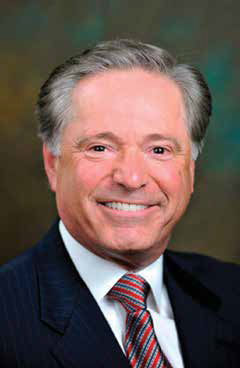
12 Michael Mecca
President and COO
Galaxy Entertainment Group
On 1st September, Galaxy Entertaimnet Group announced it had appointed veteran casino executive Kevin Kelley as its chief operating officer, Macau, with immediate effect, leading to Michael Mecca dropping the COO designation from his title.
“As part of GEG’s growth journey, the company now enters into the next phase of our development. We will continue to lead our Macau business in its current success and to devote more attention towards growth opportunities in realizing our regional and global vision. Mr Michael Mecca, in his capacity as President, GEG, will continue to pursue regional and global expansion opportunities for the company,” the company’s VP of public relations Buddy Lam explained.
“With 40 years of gaming, hospitality and entertainment experience, Mr Kelley will oversee functions such as business development, international premium and mass market development, Galaxy Macau, StarWorld Hotel, Broadway Macau and City Clubs operations as well as advancing the development plans for [Galaxy Macau] Phases 3 and 4,” according to a company press release.
Meanwhile, Mr Mecca has become a director of Société des Bains de Mer et du Cercle des Étrangers à Monaco, an operator of casinos and hotels in Monaco in which Galaxy acquired a 5% stake in July for 40 million euros ($43.9 million). SBM, 69.5%-owned by the state of Monaco, has properties including the Casino de Monte-Carlo and the Casino Café de Paris, as well as luxury hotels, restaurants and night clubs, according to its website.
GEG has been tipped by investment analysts as having shown interest in one of several new foreigners-only casino licenses the South Korean government is considering issuing in that country, and if a bid transpires, Mr Mecca will no doubt be at the lead. The company also plans to build a RMB10-billion (US$1.6-billion) non-gaming resort on Hengqin Island in mainland China, which is connected to Macau’s Cotai Strip by the Lotus Bridge, a short car ride from the Galaxy Macau resort.
Mr Mecca joined GEG in March 2009 in the run-up to the opening of Galaxy Macau. His mission, said Deputy Chairman Francis Lui, was to take the company “to the next level in its development as a leading Asian gaming corporation.” A big part of Mr Mecca’s job, as he saw it, was to take the strong customer service standards established at StarWorld, the company’s previous flagship, and transplant them to the much larger Galaxy Macau. It’s a mission Mr Mecca has fulfilled admirably, in the process establishing the company’s brand identity by ensuring guests receive the coveted “World Class, Asian Heart” experience promised in its marketing campaigns.
“We spend a great deal of time and energy training our people on a regular, ongoing basis,” says Mr Mecca. “We have dedicated people in every department who spend their entire time on the floor, and there are impactful behaviors that we monitor that are all geared towards providing the required level of service. You’ll see that every one of the security guards, as you enter, they’ll make a motion of welcome. And the dealers, after each hand, they’ll look up at the customers and make sure everything is OK. Every department in the property participates in the program, and our goal is to provide a level of service second to none in the industry.”
Prior to joining GEG, Mr Mecca served as president and CEO of Planet Hollywood Resort & Casino in Las Vegas and held senior executive roles at Mandalay Resort Group, Caesars World, Crown and Las Vegas locals giant Station Casinos. He has more than three decades of experience in the hotel and gaming industries.
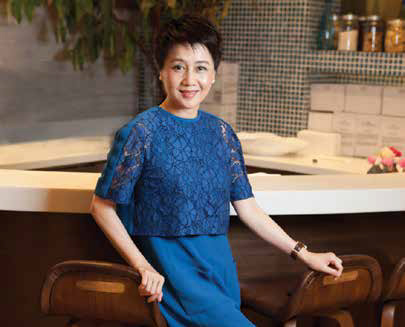
13 Angela Leong
Executive Director, SJM Holdings
Managing Director
Sociedade de Jogos de Macau
The collapse of the Macau casino bubble has cost Angela Leong around US$1 billion of her net worth, as calculated by Forbes, and sent her tumbling 511 places on the magazine’s 2015 list of the world’s wealthiest. She’s still good for around $1.3 billion, though, so no worries the 54-year-old Guangzhou native, a former dance instructor and the fourth and youngest of casino tycoon Stanley Ho’s consorts and mother of five of his 17 children, will be lining up for public assistance any time soon.
And she remains one of the most powerful individuals in Macau gaming. She owns the largest individual stake in SJM Holdings, the Hong Kong-listed parent of the casino giant Mr Ho founded, and 10% of SJM’s operating subsidiary, Sociedade de Jogos de Macau. She also controls one of the largest personal equity stakes in STDM, the Hong Kong company that ran the Ho casinos as a monopoly for 40 years before the market was opened to competition in 2002. STDM’s portfolio includes interests spanning the Pearl River Delta in banking, property development, retail, transportation and infrastructure, and as SJM’s biggest investor, in gaming still. Her holdings extend to an interest in L’Arc Macau, a 56-story casino hotel that includes private residences, retail shops and a 10,000-square-meter gaming floor that operates as one of 15 independent sub-licensees of SJM. She also serves as vice chair of the Macau Jockey Club.
But it is in SJM’s efforts to realign its business away from the VIP focus that has left it the most battered of the six casino concessions that Ms Leong’s impact will be most clearly felt.
She controls Casino Jai Alai, which the company is leasing from her in order to remodel it at a cost of HK$655 million and gain a stock of badly need mass-market gaming tables and hotel rooms. Located just outside the Macau Ferry Terminal and slated for completion next year, the property also will include a collection of shopping, dining and cultural attractions for boosting the company’s tourist profile.
More important is the influence she wields on the long-term success of Lisboa Palace, the HK$30 billion (US$3.8 billion) Cotai resort on which SJM’s future depends. She was a driving force behind a joint venture with Versace that secured for the project one of its most distinctive elements, a HK$2.5 billion, 270-room hotel the famed fashion house is helping to design and one of only three hotels in the world to carry its brand name.
She also owns a sizable parcel of land adjoining the underconstruction resort for which the company has been negotiating for at least two years in hopes of expanding Lisboa Palace’s Angela Leong Executive Director SJM Holdings Managing Director Sociedade de Jogos de Macau footprint. As it stands the 70,500 square meters allotted the project is the smallest the local government has granted to the six gaming concessions on Cotai. Ms Leong’s plot measures 200,000 square meters held by a company called Macau Theme Park and Resort which she controls. Ms Leong has expressed a desire to see a family-style amusement park at the site, something along the lines of what China resort operator Chimelong is developing on neighboring Hengqin Island. She has talked at various times of an indoor beach and wave pool, thrill rides, an equestrian center, MICE facilities and several budget hotels. Nothing has come of it so far, and it’s been reported that almost half the parcel is still in bureaucratic limbo and doesn’t actually belong to Macau Theme Park, not yet anyway.
What is certain is that Ms Leong will continue to play a substantial role in shaping the future of gaming in Macau.
She is a member of the Macau Legislative Assembly representing the New Union for Macau’s Development, a pro-business, pro- Beijing coalition chaired by SJM Chief Executive Ambrose So. She is a member of the elite committee that elects the Macau chief executive. She also holds seats on the Jiangxi Provincial and Zhuhai Municipal committees of the Chinese People’s Political Consultative Conference.
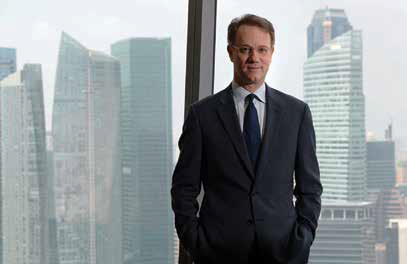
14 George Tanasijevich
President and CEO
Marina Bay Sands
Like nothing else, Marina Bay Sands declares this is not your father’s Singapore, or in the case of Prime Minister Lee Hsien Loong, son of Singapore patriarch Lee Kuan Yew, not his father’s Singapore. Marina Bay Sands’ trio of 57-story towers have become instantly recognized icons of 21st century Singapore. The rooftop infinity pool is this decade’s must-have feature for integrated resorts the world over, though few can match MBS’s commanding riverfront site, putting selfie clickers eye to eye with a dramatic skyline surrounding colonial architectural gems. Despite Chinese high rollers laying low, MBS has continued to deliver world-beating EBITDA margins and widened its advantage over Genting’s Resorts World Sentosa, thanks in part to its more central location with MRT mass transit trains stopping in its basement, plus a more comprehensive and sophisticated non-gaming menu.
The success of MBS is in large part a tribute to George Tanasijevich, who led parent company Las Vegas Sands’ bid for a Singapore license. An American with a law degree and MBA, Mr Tanasijevich worked for a leading US shopping mall developer and operator then came to Singapore to join government-linked CapitaLand, Southeast Asia’s largest property company (and one of the bidders LVS beat to win the Marina Bay IR site). LVS hired the sartorially splendid Mr Tanasijevich in 2004 as its director of development in Macau, and a year later sent him to Singapore to spearhead its efforts to win a gaming license there.
In retrospect, it seems LVS was destined to create MBS. But back in 2005, virtually every gaming company that could find Singapore on a map expressed an interest in at least one of its two IR licenses, in part inspired by the breathtaking success of LVS’s first Asian venture, Sands Macao, that opened in May 2004. Bidders like MGM and Harrah’s were far more experienced and better capitalized than LVS, which at that time had built exactly one of the properties that Singapore would term integrated resorts (and Singapore’s specifications categorically prohibited replica designs such as The Venetian). Mr Tanasijevich, with his track record in property development and history with CapitaLand, lent the outlandish LVS plans—“Now let me get this straight, the three towers are going to be curved, and on top you’re connecting them with suspended concrete as long as the Eiffel Tower for a park and swimming pool?”—desperately needed credibility.
Mr Tanasijevich, named MBS president and CEO in 2011 as well as LVS global development director, has delivered numbers befitting a property with 2,561 rooms, an 800,000-square-foot (74,400 square meter) shopping mall, 1.3 million square feet of MICE space, a museum providing state of the curatorial art lodging for temporary exhibitions, two theaters, appropriately huge-scale public artworks, plus sampans on indoor canals and an ice skating rink, surrounding the casino limited to 161,000 square feet by government mandate.
In a challenging environment, with Singapore tourism numbers declining, especially Chinese, and gaming revenue showing its customary quarterly volatility (owing to a relatively small pool of VIP players), MBS delivered $1.7 billion in EBITDA last year on a 53.6% margin, up seven percentage points from the previous year. In the first half of this year, revenue fell 8.7% to $1.5 billion and adjusted EBITDA was off 8.8% at $778.6 million on margins of 52%, the same as a year earlier.
The headline numbers may be somewhat misleading. Reporting as part of LVS, rather than a separate entity, MBS states results in US dollars, and the Singapore dollar has lost value against the US for the past year, 6% since the start of this year alone. On a constant currency, hold-adjusted basis, LVS says EBITDA was up for the first half. Rolling chip volume decreased 15.8% and overall gaming revenue fell 9.8%, but in local currency terms—the Singapore dollars players bet—average daily mass revenue reached a record in the second quarter. Over the past year, MBS is believed to have overtaken Genting’s Resorts World Sentosa for the lead in VIP play while widening its lead in mass revenue. Outstanding player debt for MBS dipped under $1 billion at the end of the second quarter with a reserve balance of $383 million.
Non-gaming elements accounted for 20% of first half revenue at $300 million, providing a solid base along with mass gaming. The Shoppes at Marina Bay Sands mall was the sole MBS segment to record revenue gains in the first half, featuring operating margins of 85.4%. MBS profits through the first half, on a trailing 12-month basis, show good balance, with 37% from mass tables, 20% from slots, 16% from hotel operations, 8% from mall leasing, 4% from MICE and other items, and 15% from volatile VIP gaming. MBS would like to expand its non-gaming footprint with additional hotel and convention space on a vacant plot just to its west, but the government has refused to let it have the land.
Where LVS would like to expand most of all remains Japan, and Mr Tanasijevich, in his corporate role, leads that effort. LVS has reportedly focused almost exclusively on the Tokyo area, Japan’s largest market and international gateway. As a good real estate man like Mr Tanasijevich knows and the experience of the two Singapore IRs shows, it’s all about location.
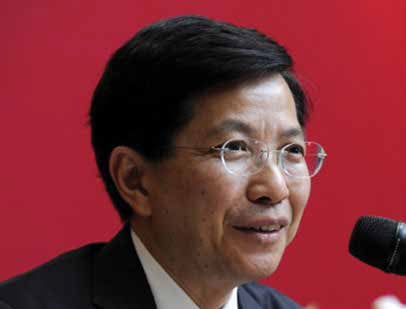
15 Tan Hee Teck
Chairman and CEO
Resorts World Sentosa
Many believe obtaining a Singapore gaming license was crucial for Genting, to protect its original Genting Highlands property, now named Resorts World Genting, in Malaysia. Tan Hee Teck, who’d joined Genting in 1982 and left, was lured back from his position as chief operating officer and executive director of Singapore’s DBS Vickers Securities in 2004 to lead Genting’s license bid. In December 2006, after losing to Las Vegas Sands for Marina Bay, Genting was granted the license for the Sentosa integrated resort site.
As Resorts World Sentosa’s chief executive from its inception, Mr Tan has overseen its construction, opening in February 2010 and operation. This February, he was given the additional title of RWS chairman. Built at a cost of $5.7 billion with 1,600 rooms, 565 gaming tables, 2,451 machines, a Universal Studios theme park, aquarium, water park and destination spa, RWS has supplanted the original Malaysia resort as Genting’s flagship property. Last year, RWS recorded revenue of S$2.86 billion (US$2.16 billion) and EBITDA of S$1.21 billion. Revenue was up 1% from the previous year, while EBITDA was down 3%. That points up one key issue for Genting Singapore: a stagnant gaming market.
For the first half of this year, revenue fell 20% from last year to S$531 million and EBITDA fell 52% to S$332 million, including a S$213 million loss on foreign exchange hedging via derivatives. Adjusted EBITDA, on a normalized hold and eliminating one-offs, including a S$110 million tax refund, was S$270 million. Gaming revenue for RWS fell 27%, pointing out the volatility of its relatively small VIP pool in a market with severe junket restrictions, amplified by the downturn in Chinese high roller play. RWS does business with the only three registered junkets Singapore has licensed, but most VIP play is direct. Morgan Stanley Asia, bullish on Genting Singapore, points out that mass revenue rose 2% year on year, adjusted EBITDA beat expectations and impairment loss fell 31% year on year to S$57 million.
Less bullish Union Gaming Securities Asia sees a growing performance gap between RWS and Marina Bay Sands. MBS has overtaken RWS in VIP roll and maintains its lead in the more profitable mass market segment. Union says Genting Singapore’s 557-room Jurong Hotel hasn’t yet contributed significantly to mass market revenue, and its distance from RWS, about 15 minutes by car, much longer by mass transit, is likely to remain an issue.
Perhaps most troubling for RWS is declining non-gaming revenue in year-on-year terms over the past four quarters, after that segment grew consistently during its first four-and-a-half years of operations. Limited MICE and retail space crimp growth, particularly in comparison with MBS.
The key to growth for Genting Singapore is expansion beyond the city-state, an effort Mr Tan is overseeing in Asia as the company’s chief operating officer. The company remains hopeful about Japan, where Genting has registered several subsidiaries. But while Japan’s casino legalization outlook remains murky, there’s a real opportunity in South Korea, where Genting is partnered with Hong Kong-listed mainland China property developer Landing International to create the $1.8 billion Resorts World Jeju.
A volcanic island off the Korean peninsula’s southern coast, Jeju is South Korea’s most popular domestic tourism spot—the one-hour flight between Seoul and Jeju is among the world’s three busiest routes, with nearly 7 million passengers in each direction in 2013—and offers visa-free access to mainland Chinese, welcoming 2.9 million last year, a 58% rise over 2013. Known as Korea’s Hawaii, Jeju’s climate is warmer than the peninsula, with temperatures rarely dropping below freezing. Jeju features Mount Halla, whose lava flows formed the 1,848-square-kilometer (714 square mile) island. Volcanic tubes and other formations, along with large tracts of pristine forest, have made Jeju a UNESCO World Heritage site.
“RWJ will be a game changer in Jeju that we believe can help the province attain its goal of surpassing 15 million tourists by 2018,” Genting Singapore Executive Chairman Lim Kok Thay said at the site’s February groundbreaking, The ceremony came after the partnership convinced newly elected Jeju Governor Won Hee-Ryong of the project’s merits. Following the RWS model, the resort will include 2,000 hotel rooms and a theme park in addition to the casino. But the 260-hectare (642 acre) site is more than five times the size of the Sentosa plot, so there’s room for more retail and residences, which the developers hope can defray much of the capital expenditure through presales. Foreigners that buy property on Jeju valued at 500 million Korean won ($421,000) and hold it for five years are eligible for permanent residency.
Jeju still represents a gamble. The casino will be for foreigners only, and Daiwa Securities predicts it will increase Genting Singapore’s earnings by no more than 2%. There could be positive impact for RW Manila, where sister company Genting Hong Kong is a partner, building the brand among Koreans, the largest visitor market for the Philippines. It’s another chance for Mr Tan to be a good team player.
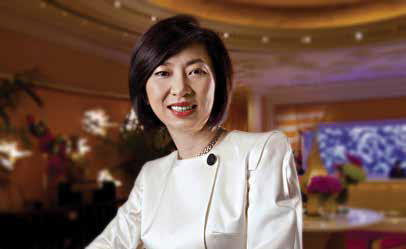
16 Linda Chen
Executive Director and COO
Wynn Macau
Linda Chen’s career in gaming began with the opening of The Mirage on the Las Vegas Strip in 1989, and she has worked for Steve Wynn continuously since the early part of the century. The experience she’s gleaned has been invaluable, and it is serving her particularly well now as she holds his Macau business to a steady course through the strongest headwinds it has ever faced.
She is realigning portions of the vaunted Wynn Macau VIP machine toward the higher end of the mass market, which in her case is a lot more than a matter of geography, it requires a deft touch. Wynn does have a reputation to maintain, and she won’t be sacrificing the upscale positioning that has always been its great strength and the source of its appeal. Plus, her gaming inventory is relatively small in keeping with that “boutique” positioning. There isn’t a lot of room to maneuver.
Wynn Macau and Encore at Wynn Macau have tended to rank behind only the much larger operations of SJM and Galaxy in VIP market share. Their mass share, conversely, tends to come in the smallest (a mere 7% in the first half of the year). This is costing the company heavily in the current downturn. Gaming revenue, which generated 89% of total revenues through the first six months, was down year on year by 37% percent as rolling chip volume and VIP win each plummeted more than 47%. Cash flow from operations fell from HK$2.89 billion in the first half of 2014 to $438 million. Operating profit was down by more than half, driving EBITDA to a 45% decline.
Shoring up margins is the other side of this thorny equation. But where Ms Chen is cutting she’s proceeding with the patience of a surgeon. Expenses were down more than 31% in the first half, mainly because gaming tax and premiums have fallen with casino revenue. Staff costs actually increased by around 4%, in part because of salary increments and scheduled bonuses, in part because the company is purposely carrying more workers than it needs to prepare a trained team for next spring’s Wynn Palace opening on Cotai.
For now, her strategy appears to be very much focused on weathering the storm, an approach that indicates how well she knows the mind of her famous mentor.
Roughly 20 VIP tables went away in the first half as junket rooms closed. Mass inventory, however, was up in the first half by only eight units, and the fact that mass table drop has held up relatively well suggests that high-limit cash play is taking up an increasing share of the slack. Poker revenue has been fairly steady as well, and four more tables were brought on line, bringing the total to 13. Eighty machine games were added also.
Next to gaming’s performance, the first half’s 28% fall-off in nongaming sales looks pretty good, and on balance it was, indicating that that Wynn’s appeal on the non-gaming side remains undiminished. She’s got the product quality to pivot from comps to cash customers and she’s making the most of it. Hotel occupancy handily outperformed the market at 96.9% in the first half, down less than 150 basis points year on year despite a HK$22 million reduction in room giveaways and without having to slash rates. F&B revenue likewise survived roughly $97 million in reduced promotional allowances without an appreciable decline, so cash business is improving in the restaurants too.
She learned her trade on the Las Vegas Strip, most of it with Wynn companies, and this is serving the China operation well in these difficult times.
The 48-year-old Taiwan native worked at The Mirage fresh out of Cornell University’s prestigious School of Hotel Administration. She moved to Kirk Kerkorian’s MGM and was there for the MGM Grand’s opening in 1993 as the largest hotel in the world at that time. She later served as executive vice president of international marketing at Bellagio after Mr Wynn’s Mirage Resorts was acquired by MGM Grand (now MGM Resorts International). She also headed up international marketing for MGM Mirage, as the merged companies were known at the time.
She rejoined Mr Wynn during the run-up to Wynn Resorts’ Nasdaq listing and has been with him ever since. She came to Macau in 2002 after Wynn Resorts won its casino concession, assuming the role she still holds today. She took on the COO title with Wynn Macau when it went public on the Hong Kong Stock Exchange in 2009. She also serves as president of Wynn Resorts’ Wynn International Marketing subsidiary.
17 Lee Choong Yan
President and COO
Genting Malaysia
Resorts World Genting is where the gaming business started for Genting Group 50 years ago, when founder Lim Goh Tong began building a road through dense topical jungle to Gunung Ulu Kali, the 1,800-meter-high (5,904 feet) mountaintop where he would assemble 14,800 acres (5,992 hectares) to create a resort, first known as Genting Highlands. The 25-kilometer (16 mile) road originated at the town of Genting Sempah, and Mr Lim chose that town’s name for his new venture. The road took four years to complete, and the site’s first hotel opened in 1971. Malaysia authorities granted a gaming license, according to Genting’s corporate history, to help develop this then remote area, even though it was just 58 kilometers from capital city Kuala Lumpur.
RW Genting has kept its national casino monopoly and grown to six hotels with 9,000 rooms, theme parks, retail, convention facilities and an arena, with 3.6 million loyalty card holders and 18.1 million visitors last year. Genting Malaysia President and COO Lee Choong Yan works with Chairman and CEO Lim Kok Tay, the founder’s son and Genting Group’s undisputed leader, to keep the family heirloom polished. While tending to the home base, Genting Malaysia also holds the group’s most far-flung assets in the UK, New York and Florida, at the center of initiatives to kick start growth for the group ahead of the opening of major integrated resort projects in Las Vegas, South Korea and the Philippines.
Revenue last year at RW Genting plus the company’s two marginally impactful non-gaming beach resorts in Malaysia was 5.4 billion Malaysian ringgit (MYR; $1.5 billion at year-end exchange rates), down 6% from 2013. The company says VIP volume grew but it suffered from a low hold percentage. Adjusted EBITDA fell 6% to MYR1.9 billion with margins steady at 35%.
The company says RW Genting remains one of the best performing IRs in the world in terms of EBITDA margins, running second to Las Vegas Sands’ Marina Bay Sands and ahead of Resorts World Sentosa. The five-year compound annual growth rate for revenue in Malaysia is just 2% and EBITDA in ringgit terms was lower in 2014 than it was in 2009, having fallen in four of those five years as margins deteriorated from 41%. For the first half of this year, Malaysian revenue rose 2% to MYR2.7 billion on improved VIP volume but, again, low hold. Adjusted EBITDA fell 5% on higher VIP costs and the advent of a national 6% goods and services tax.
Hopes to increase growth and revitalize the resort currently rest with the 10-year, MYR5 billion Genting Integrated Tourism Plan launched at the end of 2013. The plan includes additional hotels and retail, a Twentieth Century Fox Studios theme park, a new cable car system and expanding the arena to 10,000 seats. Visits and room nights sold fell last year due to work associated with the plan. RW Genting has tried to stimulate visits with 50th anniversary promotions, some looking ahead to the new facilities, enlisting Malaysian actress Michele Yeoh as a brand ambassador, and expanding express bus services to 99 locations around Malaysia. The first fruits of the plan blossomed this year as three-star First World Hotel opened its new, 1,300-room Tower 2A to reclaim the title of world’s largest hotel (verified by the Guinness World Records) with 7,351 rooms. The next additions, including the theme park, are due in the second half of 2016.
Resorts World Bimini opened the first phase of its 300-room hotel and has added to its cruise programs to visit its landbased casino and mini IR on the Bahamas island closest to Florida. The complete complex will include meeting space, retail, an upgraded beach club and craft village. The new port facility, opened a year ago, allows direct disembarkation to the island. Fifty miles west on US soil, the company is refurbishing its 527-room Hilton Miami Downtown, part of the 30 acres Genting hopes will someday become Resorts World Miami, if legislation passes to allow it to include a casino.
In New York, the company lost its bid for one of the state’s new gaming licenses. (Chairman Lim’s family controlled Kien Huat Realty was among the three winners.) Nevertheless, Resorts World New York City keeps humming along. The 5,000-machine gaming complex welcomed 8.6 million visitors last year, and business volumes continue to grow. Combined North America revenue rose 6% last year, though EBITDA dropped 87% due to construction costs in Bimini and the failed New York application. This year, first half revenue rose 23%, and EBITDA has nearly doubled.
Resorts World Birmingham is scheduled to open in the fourth quarter. It will be Genting’s 42nd UK casino and the kingdom’s first IR, boasting a 178-room hotel, 11-screen cinema, spa, and VIP facilities, including five-star accommodations. The location, next to Birmingham’s airport, will provide easy access to international high rollers, including players from Asia that make up a good chunk of Genting’s UK VIP business.
18 Ted Chan
Chief Operating Officer
Melco Crown Entertainment
City of Dreams was arguably the pioneer in targeting the high-limit cash players known in Macau as the “premium mass,” a segment offering significantly higher margins for operators than VIP and one that is showing more robust growth than the junket-driven high-roller business that has witnessed a significant slowdown of late.
“Premium mass is currently what everybody is actually looking for to grow their markets,” COO Ted Chan noted during parent Melco Crown Entertainment’s latest earnings call. “Our company really focuses more on the total experience of the customer, rather than cash, credit, rebate to customer, etc.”
That “total experience,” according to Mr Chan, entails offering the right mix of hotel rooms, F&B, retail and perks and is something he has been striving to improve ever since he joined Melco Crown’s Cotai flagship.
In August, City of Dreams unveiled its SOHO social hub—billed as “the place in Macau to see and be seen, chill out with old friends and connect with new ones”—featuring 16 restaurants, bars and daily performances. It’s the latest effort by Mr Chan and his team to bolster the property’s non-gaming appeal and joins such attractions as the popular “House of Dancing Water” spectacular produced by Franco Dragone, the thumping Cubic nightclub and sultry “Taboo” cabaret show.
“We are always raising the bar on leisure and entertainment offerings, which have been extremely well-received by our patrons,” added the 42-year-old Mr Chan, who is no doubt mindful of the need to do so, given that among the city’s six casino operators his company is the most reliant on VIP players, who contributed 84% of its total gaming revenue in 2013, compared to a market-wide average of 66%.
Melco Crown’s Q2 net revenue fell 7% year on year to US$1.3 billion and adjusted EBITDA declined 11% to $313.6 million. Weakness in Macau’s VIP sector was largely to blame, with the company’s VIP-centric Taipa property, Altira, taking the largest hit, with adjusted EBITDA plunging 62%, while adjusted EBITDA at City of Dream, where the premium-mass segment constitutes a much greater proportion of total earnings, was only down 3%. Adjusted EBITDA at the company’s Mocha Clubs chain of Macau slot parlors was down 11% to $8.6 million in the quarter.
Mr Chan took up his current position with the company in February 2012. For two years prior to that, he had been co-COO, Gaming, while Nick Naples headed operations. Mr Naples left in conjunction with Mr Chan’s promotion, the culmination of a gradual assumption of all senior roles at the company by Chinese executives.
Mr Chan is a longstanding and trusted associate of co-Chairman and CEO Lawrence Ho’s, having worked as his assistant between 2002 and 2006. He went on to head Mocha Clubs before leaving to become CEO of an outside company, albeit one that worked in close cooperation with Melco Crown—Amax Holdings, a Hong Kong-listed junket aggregator that played a key role in sustaining Crown Macau (now Altira), Melco Crown’s first casino, when it opened. He returned to the fold in November 2008 as president of Altira prior to assuming the co-COO position at City of Dreams in the summer of 2010.
In the ports business that made him a billionaire, Enrique Razon started in Manila then went global. He’s doing the same thing in the gaming business.
Bloomberry Resorts opened Solaire Resort and Casino in March 2013, the first property in Entertainment City, the 120-hectare (297 acre) casino cluster in the making on Manila Bay. Solaire has been a game changer and bar raiser for Manila. The opening of the Sky Tower last November took Solaire to another level, featuring a tropical garden lobby with twin waterfalls, leading to an all-suite hotel wing and expanded VIP gaming space, a theater and karaoke bar, with a retail mall and nightclub still to come. Mr Razon’s stamp is all over Solaire, from its positioning to appeal to high-end customers to its Philippine artworks, many of them from his private collection, decorating the property. The $1.2 billion resort became the Philippine gaming market leader this year, with first half gross gaming revenue of P15.6 billion ($347 million), up 10% from a year earlier, even though Entertainment City’s second IR, Melco Crown’s City of Dreams Manila, opened last December.
“Solaire continues to experience steady and continuous growth especially in all gaming segments,” Mr Razon, controlling around 30 inside asian gaming September 2015 60% of Bloomberry shares, said. “That this is happening despite new competition gives credence to our conviction that the Philippines is a prime market for gaming for both local and foreign players. We’re on the right track.”
Rather than examining Solaire’s successes to understand Mr Razon, it’s perhaps more instructive to look at what he did when he thought Solaire had gone off course. Solaire got off to a sluggish start under management of Global Gaming Asset Management, former Las Vegas Sands President and COO William Weidner’s group loaded with ex-LVS senior executives, which also bought an 8.35% stake in Bloomberry. Mr Razon, who can be spotted around Solaire wearing jeans and an oxford shirt open at the neck, expected to see top GGAM executives on site far more often than he did. Especially when the business struggled, he wanted his management team to be all in, like him. So barely six months after Solaire’s opening, he fired GGAM. The parties are still in arbitration over a settlement, but meanwhile Mr Razon acted boldly to right his investment. In a bit of irony, he hired another LVS alumnus, former Marina Bay Sands CEO Thomas Arasi, to replace GGAM.
Early this year, Mr Razon began to realize his ambition to take Solaire global in Korea. He reportedly explored possibilities in several of the 21 countries where International Container Terminal Services, the company his father started, runs ports, without finding satisfactory opportunities. With South Korea putting two gaming licenses on offer, Bloomberry, through its Solaire Korea subsidiary, purchased 12.2 hectares on Muui Island, a seaside resort close to the nation’s gateway airport in Incheon. Muui is within the Incheon Free Economic Zone where Caesars Entertainment and South Korea’s largest casino operator Paradise, in partnership with Japanese gaming machine maker Sega Sammy, have already been licensed to build IRs. Construction work is to be completed in 2017 on a bridge that will make it a 15-minute drive to Muui from the airport.
In March, Mr Razon doubled down on his Korea bet—twice. In Incheon, Bloomberry bought 21-hectare Silmi Island, adjacent to its Muui site. Sightseers flock to the area to see the strait between the islands empty spectacularly at low tide, enabling people to walk between the islands. Bloomberry has formulated a $3 billion master plan for the site that includes hotels, residences, a wedding chapel, water park and naval battle reenactments. Mr Razon has taken a very hands-on approach to the project, a source says. “It’s the kind of thing he loves.”
Bloomberry’s Incheon project is one of more than 30 applicants reportedly vying for two foreigner-only casino licenses. There’s no guarantee it will win one. But Bloomberry has already secured a Korean gaming license on Jeju, the resort island off Korea’s southern tip that’s a very popular domestic and foreign tourist destination. In March, the company announced it had purchased LVegas Casino and T.H.E. Hotel in Jeju City, where most of the island’s eight foreignersonly casinos are clustered. Jeju, an autonomous region, gives visafree access to mainland Chinese. Genting Group is building a $1.8 billion IR on Jeju in partnership with mainland property developer Landing International. The casino license that came with LVegas would smooth the regulatory path for Bloomberry to build its own IR there, if it so chooses.
Korea is a good fit for Bloomberry, drawing gamblers from close by northern China, while Manila’s Chinese clientele is mainly from the country’s south. The Philippines’ biggest inbound tourism market is Korea, so quality properties in Korea with attractive nongaming components catering to locals could encourage them to choose Solaire when they visit Manila. It’s a bold but smart play, the sort that’s characterizes Mr Razon’s business success.
Resorts World Manila introduced the integrated resort concept to the Philippines and is credited with doubling the gaming market to $2 billion. The IR’s Travellers International Hotel Group parent company broke ground last year on the $1.1 billion Bayshore City Resorts World in Entertainment City. Due to open in 2019, Bayshore will be the last of the four IRs in the bayfront cluster.
A Travellers executive said that being the first mover in the market and the last to build in Entertainment City is the ideal position to be in. That’s likely true in the long run, but currently it’s putting the squeeze on Travellers as it faces increased competition from Entertainment City’s’ expanded Solaire Resort and Casino and newly opened City of Dreams Manila. Travellers’ net revenue fell 5.5% year on year in 2014 to 29.1 billion pesos ($647 million), and another 13.5% in this year’s first half. Gross gaming revenue decreased 12.7% last year to P26.2 billion and 7.9% in this year’s first half to P12.5 billion, putting RW Manila into second place in the market, behind Solaire at P15.6 billion. Thanks to cost cuts, Travellers’ first half EBITDA of P3.5 billion was just short of Solaire’s P3.6 billion.
Industry executives express surprise privately that RW Manila got caught, citing its head start and more accessible location, across from Ninoy Aquino International Airport’s Terminal 3 and connected to major highways. Others suggest the market may be advancing beyond RW Manila’s middle brow offerings. Travellers says lower gaming volume is largely due to focusing on its mass business while exercising “more prudence” in its approach to the VIP segment, which accounted for as much as 70% of gaming revenue in previous years. First half VIP drop fell 37.5%, though VIP revenue was only off 6.3% thanks to higher hold. VIP compromised 46% of total revenue in the first half, which matches the VIP proportion of its 311 tables.
RW Manila still has plenty in its favor. The $800 million complex features three hotels with 1,200 rooms, more than Solaire or City of Dreams Manila, under Genting’s all-suite Maxims brand, five-star Marriott Manila and Travellers’ own three-star Remington. The RW Manila shopping mall is larger than its rivals’ (Solaire’s retail will be smaller, whenever it opens). RW Manila also includes a 1,700- seat theater, multiplex cinema, nearly 50 restaurants and bars, and an office building housing Genting Hong Kong’s Star Cruises training facility that also provides courses for other hospitality companies.
The resort isn’t standing still either. It’s in the midst of a $650 million expansion in two phases that will essentially double its size when completed in 2017. Phase 2—the initial resort is Phase 1— includes a new Marriott wing with 227 rooms and a grand ballroom that management hopes will drive more non-gaming traffic. That’s all expected to be finished this year. Phase 3 will add two new hotels—the Hilton Manila and Sheraton Manila—as well as expanding Maxims, 855 new rooms in total. Under market regulator Pagcor’s formula linking gaming capacity to accommodation space, RW Manila estimates the expansion will enable it to add up to 285 gaming tables, 1,710 slots (it currently has 2,000) and 1,710 electronic table game positions.
The company has prioritized RW Manila expansion over its Entertainment City project, and some doubt whether Bayshore City will be built unless the market’s growth rate accelerates as Entertainment City develops.
Travellers is a joint venture between Genting Hong Kong and Philippine billionaire Andrew Tan’s Alliance Global Group, a conglomerate with holdings spanning brandy and McDonald’s franchises to property. Mr Tan is a rags-to-riches hero of Philippine business, a self-made tycoon thought to have a firm grip on the national consumer pulse. Travellers President Kingson Sian is one of Mr Tan’s most trusted lieutenants and a company director. Mr Sian also serves as president of Alliance Global and a corporate director, as well as a top-level executive at other real estate and hospitality subsidiaries.
Travellers listed on the Manila stock market in 2013, and like other Philippine gaming stocks, it’s been battered this year. At the start of September, Travellers shares were down 51% year to date, City of Dreams Manila developer Melco Crown Philippines was off 58% and Solaire parent Bloomberry had fallen 45%. Some local analysts feel casinos need to show better performance to get their stock prices moving up, while others believe the sector is being unfairly grouped with Macau stocks. Optimists may have the stronger case.
The Philippines is the largest Asian market that’s showing significant growth, up 16% in the first half of this year, according to Pagcor, after a 14% rise last year. It’s got a strong and—unlike Singapore and South Korea—unrestricted domestic market backed by healthy economic growth and a diversified international base. Manila has new product in the pipeline to make it a more attractive destination. Travellers is Manila’s only private casino operator poised for two bites of that cherry. Now that’s a good position to be in.
Next: The Asian Gaming 50 – 2015: 21-30








